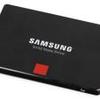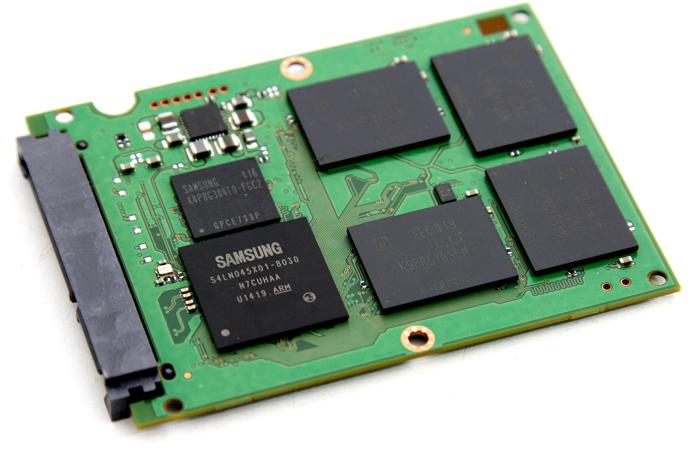Final words and conclusion
Final words and conclusion
Samsung created a lovely product with the 850 Pro series of SSDs, they are remarkably fast in pretty much any and all tests from our benchmark suite. The drive is continuously in the top 5 of tested SSDs performance wise and to see performance that high with such consistency shows that the SSD is done right. Next to that we just have to touch on the topic of power consumption. The power consumption of the Samsung SSD is low with an IDLE rating of 2 mW, but roughly 3 Watts when in use. Then again, most regular SSD drives use roughly 2 to 4 watts of power when active.
Performance
Overall this SSD shines at many factors and on many levels, IOPS performance is very good. This SSD writes and reads serious amounts of tiny files in a very fast fashion. We stated it before though, IOPS is not something you as a consumer should worry about too much unless you are doing a lot of database related work or create similar workloads on your PC, but this SSD certainly ranks high within this aspect.
Trace testing - we think by far the best test in our entire benchmark suite is PCMark Vantage 64-bit. This is a trace test and can emulate what you guys do on your PC but then multiplied by factor 100, with slightly more focus on read performance though. The outcome of the results with the Samsung 850 Pro are impressive. Sustained read / write performance, again excellent. Read performance in particular leads and is top ranking. Write performance is a tiny bit behind the top tier competition, however nothing that you'd ever notice in real world usage. So overall the 850 Pro series is impressive. Zoom in at both IOPS and Trace performance and you'll notice that the SSD can manage serious workloads without breaking so much as a drop of sweat.
Overall SSD Usage
An SSD is enjoyable, very much so. If you put a drive like this into your SATA 3 compatible laptop or SATA 3 compatible PC, you'll have no idea what is about to hit you. We very much enjoy the grand sustained performance of this SSD series; if you copy a vast amount of compressed data, then the 850 Pro will perform seriously fast in performance. Make no mistake, replacing a HDD with an SSD in your desktop PC or laptop eliminates the random access lag of the HDD head, it is no longer mechanical. That combined with the performance SATA3 offers these days is simply a massive difference and probably the best upgrade you can make for your computer anno 2014.
SATA Controllers
Some overall recommendations then. Should you be in the market for a SATA 3 SSD then we have a couple of hints though. First and foremost, if you have a SATA2 controller only on your motherboard, then you'll get limited at roughly 270 MB/sec read and writes. SATA3 (6Gbps) will free you up from that allowing the SSD to perform in the 500 MB/sec range. It is however important that you connect your SSD to the proper controller. We absolutely prefer the performance of the Intel Series 6 and 7 (H67/P67/Z68/Z77/H77/Z87/X79/H97/Z97/X99) integrated SATA 6G controller over anything else available on the market. If you run the SSD from a 3rd party controller like say a Marvell 6G controller, you will see lower performance. The new AMD 85X chipsets also offer fantastic performance. The more recent Asmedia controllers we spotted lately on motherboards are also offering good performance, albeit still 20% ~ 25% slower than Intel's controllers. Also make sure you run your drive in AHCI mode, it does make such a difference in performance, a big difference.
Pricing and Warranty
First a generic rule that I always apply; you probably should stop looking at Solid State Disk technology as if it were a traditional HDD. We'll all be old and grey before the two reach the same price or top the multiple TB volume storage the HDD offers for less money. Comparing an SSD with an HDD is making a comparison in-between an integrated IGP or a dedicated graphics card, that last one will cost you a heck of a lot more yet you gain incredible overall performance.
It is the very same with an SSD, use it as boot drive on Windows and applications and you instantly have removed a huge bottleneck, namely load and access times. It's a night and day difference (in a proper system). For massive storage like movies, MP3 files and bulky data you do not access on a regular basis, sure, that's where the HDD remains the winner as a cheaper storage solution.
Guru3D's rule of thumb; the magic simply is finding a good combination in-between the two and balance things out. Use a nice 256GB SSD for your operating system and applications, and park these movies and MP3 files onto a separate TB HDD. That's where the magic happens. I kid you not, all my test systems and work systems run on SSDs, not once have I considered going back to HDDs. The benefits of a good SSD are simply grand. But that doesn't mean I do not understand the budget and cost dilemma that many of you are facing though.
Pricing
As mentioned on page two of this review the launch price for this SSD was high, we looked up the numbers from some online etailers. Samsung is able to keep the prices more competitive.
- 128GB costs 100 EUR / €0,766 GB
- 256GB costs 160 EUR / €0,601 GB
- 512GB costs 315 EUR / €0,599 GB
- 1024GB costs 550 EUR / €0,531 GB
Concluding
The tested 850 Pro model which should offer you the comfort of an increased number of cell write cycles, but not only that. The Pro model offers very strong SATA3 performance throughout the scoreboard. In fact we can easily classify it as a top 3 SSD out of all SSDs tested throughout the years. The new 3D V-NAND allows Samsung to stack NAND cells and this use less physical NAND IC chips per SSD, and thus you gain more per wafer produced. For Samsung this is a methodology to create more cost effective chips - e.g. less chips used per SSD. The SSD overall shines at read performance and is downright good at write performance, both the trace and IOPS tests are exceptional and the sustained reads simply good. If IOPS matter to you for say database utilization with heavy workloads on the storage unit then again, this is a segment where the 850 Pro SSD is very strong. The introduction price was pretty high, but a few months after the initial launch prices have dropped already. Bear in mind that the aforementioned prices are based on street prices, not MSRP. Now that is a little higher than your average SSD but remember, this is an enthusiast class SSD with exceptional endurance claims. Samsung offers a really nice warranty, you get 10 years with the 850 Pro. Combine that warranty with the more than great performance numbers and that great power consumption and we can only conclude that the Samsung 850 Pro SSD is a winner in our book. Wholeheartedly recommended, though for consumers there is so much other stuff out there. Peek at some more of our reviews.
Recommended Downloads



